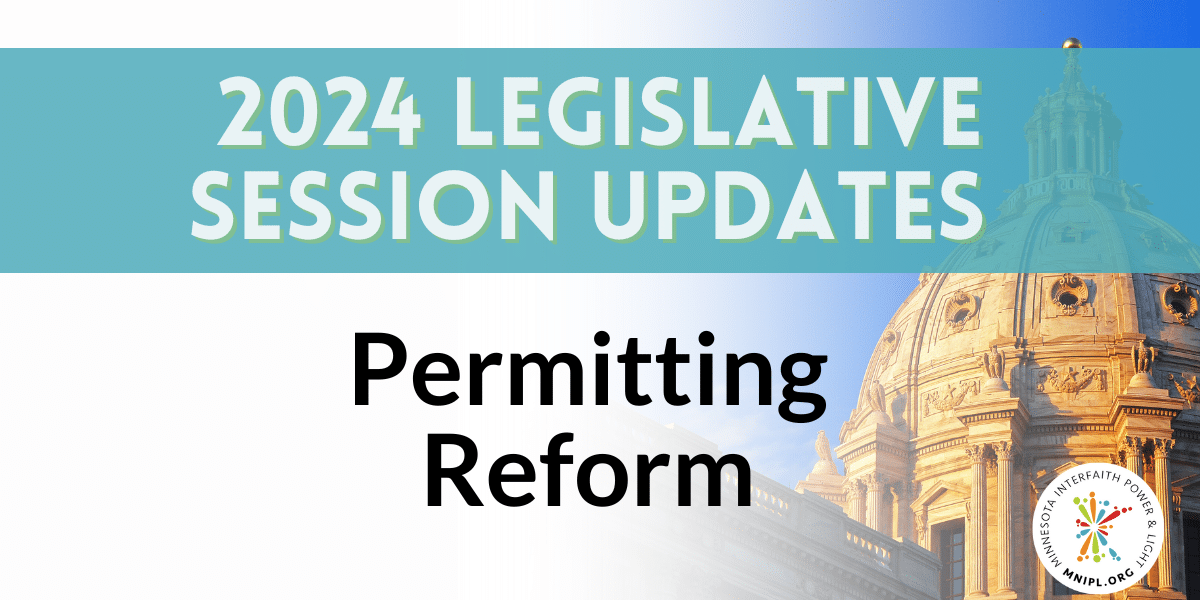2024 Legislative Session Update: Permitting Reform
While MNIPL strongly supports permitting reforms that streamline processes for clean energy like wind and solar, we had significant concerns about reforms that might weigh in favor of fossil fuel projects.
Throughout the session, MNIPL looked closely at proposed language and connected with legislators about our hopes and concerns for the resulting legislation. We worked with many other organizations who echoed our concerns.
Our Permitting Reform Wins
Back in April, that engagement resulted in significant and meaningful changes to what had been proposed in the Senate bill. Together we stopped:
- the removal of environmental protection policy language that balances human and environmental health with energy needs
- a change to Certificate of Need criteria that would have made it easier to approve petroleum pipelines
- removing the Certificate of Need for all “carbon free” energy sources, which also had the effect of removing the moratorium since 1994 on the construction of new nuclear energy in Minnesota.
Continuing Concerns
Some concerns remained in the bill. In light of the carbon pipeline proposals facing Minnesota, we were also concerned about:
- moving the Energy Environmental Review and Analysis function (EERA) from the Department of Commerce to the PUC, which would affect all energy projects, including petroleum and carbon dioxide pipelines
- provisions that deleted project application requirements, including the need to identify plans for pipelines, transportation, or electrical transmission systems required to construct, maintain, or operate an energy facility.
But we supported the process and remained engaged hoping that we could end up with a bill that would serve Minnesota well.
The Resulting Permitting Reform Bill
Negotiations between the House Climate and Energy Chair Patty Acomb and Senate Energy, Utilities, Environment and Climate Chair Senator Frentz continued until the last days of session. The resulting deal was truly a compromise designed to mitigate the concerns held by each side. Several new provisions became part of the final deal that we are hopeful will further public transparency, climate justice and the health of our communities.
- EERA will move to the PUC, though with new safeguards for maintaining public transparency of communications between PUC Commissioners and staff when the communication is regarding the proposed scope of the environmental review.
- A Carbon Dioxide Pipelines Study is funded with $1 million from the Renewable Development Account: The Commission must contract with an independent third party to conduct a study that 1) assesses the human health and environmental impacts that result from constructing, operating, and maintaining carbon dioxide pipelines; and 2) make recommendations regarding regulations. Among other things, the study must include:
- The potential human and environmental impacts of a carbon dioxide pipeline leak or rupture;
- The greenhouse gas emissions resulting from carbon dioxide pipelines including when the carbon dioxide is used to extract oil or gas supplies from underground reservoirs (enhanced oil recovery). The report is due no later than November 1, 2026.
- New requirement that all carbon dioxide pipelines go through an Environmental Impact Statement process according to the standards of MEPA, the Minnesota Environmental Policy Act. Without this provision, an environmental impact statement for these projects was not assured.
- And the project application detail requirements that were absent in the initial bill were included in the final bill.
These wins would not have been possible without the concern you shared throughout and over the last weeks of legislative session. Thank you! Your advocacy matters!

